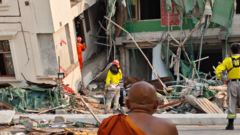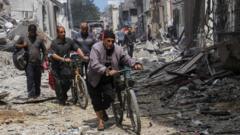In the wake of the 7.7 magnitude earthquake that struck Myanmar, Secretary of State Marco Rubio defended the U.S. government's response, attributing limitations to the complexities of a military-controlled region and urging other wealthy nations to contribute to relief efforts.
Rubio Defends U.S. Approach to Myanmar Earthquake Relief Amid Criticism

Rubio Defends U.S. Approach to Myanmar Earthquake Relief Amid Criticism
Secretary of State Marco Rubio addresses the controversy surrounding the U.S. response to the recent Myanmar earthquake, emphasizing the need for global cooperation in humanitarian efforts.
U.S. Secretary of State Marco Rubio has faced scrutiny regarding the United States' response to the recent devastating earthquake in Myanmar, which recorded a magnitude of 7.7 and resulted in over 3,300 confirmed deaths. Critics have pointed to the Trump administration's cuts to the U.S. Agency for International Development (USAID) as a key factor that hampered the ability of the U.S. to offer timely humanitarian assistance.
During a press briefing, Rubio responded to questions from the BBC, asserting that America cannot be expected to act as "the government of the world." He acknowledged the challenges faced by the U.S. in deploying aid, citing Myanmar's military junta as a complicating factor despite the government having formally requested assistance.
Significant voices within humanitarian circles have criticized the administration for dismantling USAID, which traditionally deploys rescue teams equipped for such crises. Rubio, however, insisted that balancing various national interests was crucial, implying that the U.S. would continue to support relief efforts, albeit in a limited capacity. "We are going to do our part. We have people there already, and we will help as much as we can," he stated.
Former USAID officials have accused the Trump administration's policies, particularly those initiated by Tesla CEO Elon Musk, of significantly undermining America's capacity to engage effectively in international humanitarian relief. Rubio challenged their claims, suggesting a broader expectation of contribution from wealthier nations, including China and India, who he noted had been early responders to the crisis.
The Secretary of State characterized previous critiques of the U.S. aid approach as misguided, emphasizing a shift away from funding NGOs that he believes inefficiently allocate resources. "We are no longer going to spend 10 million, 100 million dollars to get 10 million to recipients. We will work with governments and NGOs on the ground that can deliver assistance directly," he asserted.
As the U.S. navigates its role in ongoing humanitarian crises, the Myanmar earthquake has highlighted a complex interplay of international relations, domestic policy, and global expectations for assistance in times of disaster. The lack of extensive U.S. involvement in this case may reflect deeper strategic choices made in previous administrations that continue to resonate today.























